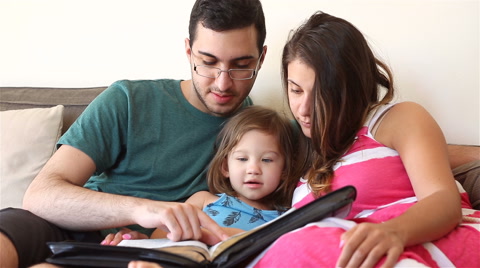
Hardly a day goes by in which we are not reminded by some major news source that “atheist” and unaffiliated” religious categories are growing among Millennials. For those of us trying to raise children who walk in the truth, the odds aren’t in our favor.
According to Barna Group, 70% of kids raised in Christian homes will walk away from the church after high school. So many of our children these days end up becoming like that third seed in Matthew 13, who fell among thorns that grew up and choked out the tender plants.
So what’s a parent who loves the Lord supposed to do?
While there’s no recipe or magic formula that will guarantee our kids keep the faith, it’s not a total crap shoot either. There are some environments that are more conducive to growing godly offspring than others.
And though we realize that God is completely sovereign over the results, a decent environment is important for outcome.
This post contains affiliate links.
Give Them Reasons to Believe Outside of Themselves
Most teenagers are woefully unprepared for the onslaught of challenges to their faith they’ll receive when they go off to college. They’ve been brought up to love the Lord with all their hearts, without also loving Him with all their minds.
They may have experienced the saving power of the Gospel but cannot actually articulate why they believe, and that lightweight faith is being carried away by the wind of skepticism on college campuses across America.
Our kids need hard answers to why Christianity is not only logical, but also reasonable. A firm foundation of apologetics will help prepare them to give a defense for their faith (1 Peter 3:15), and evaluate claims of other worldviews.
There are a wealth of apologetics resources for children, starting as young as age four. Purchase some and go through them together with your kids.
I highly recommend Natasha Crain’s Keeping Your Kids On God’s Side: 40 Conversations to Help Them Build a Lasting Faith, so you’ll be able weave these into every day discussions.
Waiting until they’re old enough to attend a worldview seminar or camp won’t be nearly as affective.
Include Your Kids in Worship Services
Children are usually segregated in modern day churches from their parents and grandparents into their own age- specific programs. As a result, the strength that comes by generational connection and a culture of honor is dissipating and with it, the Church.
Kids are used to having programs tailored to their needs, complete with lots of entertainment and unfortunately very little substance. When they try to reintegrate into services as adults, they find it difficult because they have been disconnected from the larger Body of Christ for the past 18 years.
They also expect the church to serve them, instead of the other way around.
There’s something even more important to the salvation of our children than parental discipleship, and it’s not Sunday School or midweek activities, or even youth programs. It’s the hearing of God’s Word.
For the word of God is living and active and sharper than any two-edged sword, and piercing as far as the division of soul and spirit, of both joints and marrow, and able to judge the thoughts and intentions of the heart. – Hebrews 4:12
It’s through the powerful preaching of Scripture that God chooses to work on the hearts of our children. Much of what the pastor says may appear to go right over our kids’ heads, but they will absorb what is learned and seeds will be planted that have long lasting effects.
Children in church also learn to sing to the Lord, share compassion and concern for others, and pray corporately.
Limit Worldly Influences
Cross-cultural or “third culture” kids are children raised in a culture other than the one they were born into. When they come back to the country of their origin, they do not assimilate into its culture because they are so rooted in their expatriate culture. While they live in one place, they’re really citizens of another.
The truth is that as Christians, we are foreigners and strangers in this world (1 Peter 2:11). Though we live here in this fallen world, our citizenship is in Heaven. Simply put, this world is not our home and we should not live as if it is.
Our children are saturated in pop culture, and it is shaping their thoughts and actions. Greed, sexual immorality, romanticism, vow-breaking, materialism, abortion, entitlement, relativism, etc. are increasingly celebrated rather than fought in popular movies, books, and music.
Instead of letting our kids consume a steady diet of today’s mass culture for the sake of being relatable, we should be creating a counter culture in our homes that promotes the respect of God and centers around His Word.
Obviously, it’s impractical to isolate ourselves completely from the world around us, and our kids need to learn how to exercise self-control. We can, however, help our children evaluate media they watch, read, and listen to by asking questions like:
- does this encourage the breaking of God’s laws?
- is this full of sexual content, immodesty, violence, language, or disrespect?
- does this portray elements of the occult that includes magic, fortune telling, casting spells, and witches or vampires cast as “good”?
- does it play more on emotions than engage the mind?
Third Culture kids are described as spokespeople, bridge builders and natural change agents. They aren’t only advocates for the ethnicities they’ve become acquainted with, but have developed a unique ability to transfer their cultural intelligence to brand new places.
Likewise, our kids shouldn’t be so assimilated (conformed) to the pop culture that they lose their ability to be ambassadors for Christ.

Provide a Christian Education
This is the “elephant in the room” with respect to the lack of a biblical worldview among youth growing up in Christian homes, and why the Church is losing the culture war. An increasingly secularized education system will always produce an increasingly secularized society.
If Christian influence in the culture has dissipated over the last 100 years, it isn’t for lack of Christian evangelism and Christian churches. Each successive generation is discipled in the schools by teachers who were discipled in secularized public or Christian universities.
After spending 10,000 hours in these secular classrooms, of course children will be affected by what they see and hear. Children may love Jesus with their hearts, but they are being trained to think secularly.
What you pour into a child’s mind determines what she thinks, and what she thinks determines how she acts, regardless of her heart-filled faith. The one thing that can overrule a person’s heart is their mind!
Teach Your Kids to Hope in Jesus Alone
Like anything else, Satan takes something good and tempts us with a counterfeit. I believe all the people who are “shouting their deconversion” are actually railing against this, but they’re doing it in a faulty way.
Instead of realizing and admitting that they never truly trusted Christ and now submitting to Him, they turn to the world for the answers that religiosity didn’t provide.
It’s clear that their hope this whole time was in something other than the saving power and work of Jesus.
We can’t just raise our kids in a culture permeated by Christian music, movies, education, youth groups, lingo, etc. and then expect that that’s going to insulate them from the harsh realities of the world. Or equip them to stand strong in their faith.
What happens when they turn 18 and leave the comfort of that culture? What happens when their friends say they no longer believe?
As Sally Clarkson put it so well: “Christian activities and interests do not make a home Christian. A Christian home is never defined by what the children are doing; it is defined by what the parents are doing.”

We need to be in our Bibles and committed to prayer. We have to guard against moralism posing as Christianity and good works masquerading as the Gospel.
Most of all, we have to teach our kids to put their hope in Christ alone. Read with them the hard stories in Scripture of Job, Daniel, and the apostles in Acts. Read the biographies of missionaries who, while they despaired of life itself at times, continued to put their trust in God.
Don’t divorce pain and hardship from the Christian life. Jesus never promised us a care-free, prosperous experience if we follow Him. It’s more like “take up your cross daily”.
That’s what our kids need to hear. That while this life may be full of disappointments, struggles, and harsh realities, they have a Redeemer and Savior who walks with them through it all until they reach the finish line and enter into glory.
Model Authentic Faith
There is a saying that more is caught than taught. While it’s important we teach our kids what the Bible says, it’s crucial they see that our life and our doctrine match up. Otherwise, they may have an appearance of godliness, but deny its power (2 Timothy 3:5).
The Gen2 survey conducted by Generations found that the child who abandoned his faith was almost 600% more likely to refer to his parents’ hypocrisy as a reason. If we give way to idolatry, our children will usually follow in our footsteps with their own choice of idols.
Kids get the message loud and clear as they watch us prioritize other things over their relationship with the Lord. They’ll know whether Christ is merely a spoke on your family’s wheel instead of the hub.
Parents who don’t walk in accordance with their beliefs are communicating that their faith isn’t relevant. Authenticity, humility, confession of sin, and true faith really matter, if the next generation is going to walk with God.


This is all so spot on! Being a youth pastors wife, I also see the need for parents and the church to teach children and teens how to do the spiritual disciplines themselves – i.e. how to study the Bible on their own and how to pray. When their programs simply spoon feed lessons or focus on fun (like you mentioned) the kids can see spiritual things too lightly. I’ve seen many youth appreciate when the Word is taught my honestly and faithfully instead of being watered down for them. We sometimes underestimate the depth of spiritual understanding teens and children have and miss out on opportunities to disciple. Thanks for addressing this! Ultimately we have to pray that God will save them and preserve them in the faith.
Thanks Dani! You are so right that we underestimate our kids’ understanding of spiritual issues and miss those chances to disciple them. We end up keeping them on “milk” instead of feeding them the solid food they desperately need to grow in Christ. And when they also feed on too much of what the world offers, they lose their appetite for Him.
Look forward to helping grandchildren keep their faith when leaving home.
It’s awesome you are such an involved grandmother, Arliss! Kids need that wisdom and guidance from older generations. 🙂
This is timely! Our Assistant Pastor preached a message this morning entitled, “A Voice to the Generations.”
I love what you said in the last sentence about how authenticity, humility, confession of sins, and true faith do matter!
Whether we believe it or not, the next generation is a product of the decisions that the current generation is making.
“Whether we believe it or not, the next generation is a product of the decisions that the current generation is making”- yes, absolutely!! Our current generation initiates the apostasy and the next completes it. Thanks for reading and commenting, JudyLynn!
This is a really helpful and thought-provoking post – thank you!
I’m on board with all the points apart from the impact of secular education. While I see your logic, I need a bit of time to process what that looks like in my context (the North East of England) where there is no such thing as a Christian education and where home schooling is extremely rare. Food for thought!
Wow, I guess I take it for granted that everyone else has the same homeschooling freedoms we enjoy in America. I’ve read that homeschooling is growing in the UK, and another family I know of who lives in Holland homeschools their children even though it’s pretty rare there also. Up until the last 25 years or so it was virtually unheard of in the US, but plenty of parents still did it! Thanks for reading and commenting, Cathy. 🙂
Such great information. My son is young now and I know these stats will probably worsen as he gets older. These are some strategies I can start implementing now to prepare him.
Yup, it’s never too early! I wish I had done some things differently when my kids were younger.
Thanks, Marisa, for this call to action for parents. We set the example for our kids in our speech, actions, and attitudes. If they find us to be phonies and fakes, we are to blame. However, many of the younger ones have become stronger in their relationship with God because of a poor parental example. But they’ve had to search for good mentors. One thing I’ve noticed that has meant a lot to the spiritual development of children (aside from the all-important parental example) is a fun church camp where they experience God’s presence.
Enjoyed your article.
Yes, our kids mirror so much of what we do! We are crucial to their spiritual development and our love for them must come from a love for God first. The youth in our church go away to a camp/retreat each summer and there’s a lot of fruit that comes from it. I’m so glad you enjoyed the post, Laura!
I really think this article misses one main point of change in the christian community over the past 20 years. Colleges have not changed. They have always been secular and worldly. What has changed is the movement in many christian churches to get younger and younger children saved. I have witnessed churches pushing to have 4 year old saved. I have tried to point out children are in a safe condition until the age of accountability. The. Wednesday night program was all about teaching salvation not bible study work. No interest in getting the whole family involved at all. But churches have programs to givr each child the questions and answers to be saved. So if you are pushed to be saved at a young age, what about learning the meat of the word? No because the churches are onto the next group of kids. And by the time children are teens they realize it’s once saved always saved so why follow Gods commandments??? Well, no one taught them stewardship or bible reading habits. Church was a place you went to to feel an emotional feeling sing praise songs. They haven’t hit college yet and this is how they view it. They know church is a place not a body of believers.
That’s an excellent point, Amy. Many churches are so focused on altar calls and baptisms that they neglect the discipling of youth. Here’s where parents need to take an active role in the spiritual development of their kids, but most have abdicated that responsibility to the church. You may want to check out an article I wrote which addresses this: https://jwg.rsq.mybluehost.me/2016/07/25/stop-relying-on-the-church-to-teach-your-kids-spiritual-truths/
Thanks so much for this article. You brought voice to many of the concerns I have for my children. It’s not easy being a parent in this secular world! How do I navigate these
rough seas? I believe in God’s “grace” and pray it will fill my children with love and faith. God had a plan. I believe that a child should be baptized at a young age. Thus, the grace of God will lead them on a spiritual journey and, God willing, everlasting life.
This is spot on!! Thank you for addressing this very important issue! More than half of my youth group is no longer in church and most of the people at my church are now over the age of 55. It is honestly so sad for me to see the lack of Millennials and Gen X’ers at our church.
I couldn’t agree more, Marisa! Thank you so much for another wonderful article. I will be filing this one away for inspiration as I raise my own littles. All the points were spot-on, but I especially loved this one:
“Most teenagers are woefully unprepared for the onslaught of challenges to their faith they’ll receive when they go off to college. They’ve been brought up to love the Lord with all their hearts, without also loving Him with all their minds. They may have experienced the saving power of the Gospel but cannot actually articulate why they believe, and that lightweight faith is being carried away by the wind of skepticism on college campuses across America.
Our kids need hard answers to why Christianity is not only logical, but also reasonable. A firm foundation of apologetics will help prepare them to give a defense for their faith (1 Peter 3:15), and evaluate claims of other worldviews.”
You hit the nail on the head! I’m definitely going to check out that resource!